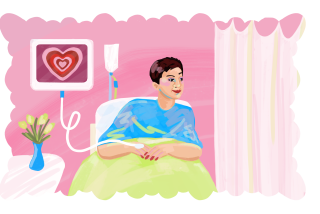Widows learn to live again
The widows, some of them at least, are moving on.
They’re back in circulation, they’re dating, and at least one is even engaged. Twenty-one months ago, when the towers fell in New York, it was unimaginable that life for the spouses of the people who died could be about anything more than just breathing in and breathing out, every day.
Now, though, they are experiencing joy again -- riding in convertibles with handsome suitors, nervously anticipating a first kiss, wondering if it’s too soon for them or too late.
Theresa Russo was one of those who said never. After her firefighter husband perished, she decided there was no other man in her future. Michael Russo was her second husband and the love of her life. In four short years together, they had a little boy and an active social life -- sailing, swimming, jogging and golfing. His death left her not just alone but unbearably lonely, aching for company, especially during those hours after she put Michael Jr. to bed. Still, she could not imagine herself with anyone else. Never, she said.
Then around Christmas she went with a group of widows from her husband’s old firehouse to a spa in Arizona. There was group therapy. She exercised and got massages. “Just being touched opened me up again,” she said. “I left a lot of my pain there.”
Back home on Long Island, she called an old boyfriend, an understanding homicide detective. They got together a couple of times. He was someone she could be with, someone she could cry in front of.
In March at a police-fire hockey game, she met another man, a tall, handsome firefighter named Tom. She was still wearing a wedding ring that night and toward the end of the game he asked if her husband would object to him having occupied her all evening. Only then did she reveal that she was one of The Widows, the dozens of women New York’s firefighter community had enshrined after it lost 343 of its own on Sept. 11. They had come to be regarded the way Jackie Kennedy was after her husband was gunned down. Americans embraced his memory through her, turning her into a living memorial to their grief. There was such a fuss when she decided to remarry that she was forced to steal away to a Greek island.
Russo’s new admirer promptly backed off when he learned who she was, putting her back on the same high and lonely pedestal with the rest of the bereaved. She prodded, however: Couldn’t he at least be her date for a dinner at her husband’s Brooklyn fire company? The evening was a couple of months off and since all she ever did was work, take care of her little boy and hang around married friends, her chances of meeting someone eligible were slim. And she absolutely could not face that dinner alone. She waited for his answer. But truth be told, she was ambivalent too. Another man -- another firefighter, no less. Was it too soon? Was she being disloyal to her husband by dating again? Would she destroy his memory by building a life that couldn’t possibly include him?
She wasn’t the only one asking those questions. There is something about the healing phase of this tragedy, however inevitable, that stirs us all.
The widows of Sept. 11 are somehow unique, particularly to New Yorkers, who saw them those first few days desperately plastering their missing posters on walls, on subway cars, all over phone booths. The widows were ubiquitous -- waiting at the armory for word, searching hospital emergency rooms and weeping as they gave interviews on street corners to the local news. We followed their progress. They embodied our wounds.
And now that they are moving on, does that mean we can too? New Yorkers are always looking for signs that we are past this tragedy, and this may be another one -- further testimony to human resilience. Or, perhaps this is the 21st century version of Scarlett O’Hara, dressed in mourning black, dancing the Virginia reel with Rhett Butler. Too brazen, too callous, too easy?
Some would say so. They are the ones who have built shrines in their living rooms to their dead spouses, the ashes in urns and laminated copies of tributes to them on the coffee table. They have handed over their finances and the running of their lives to male friends and relatives. They are still deep in mourning.
Marian Fontana was there once. Head of the firefighter widows’ organization, she said she tried a few times to date: “I’d come back saying, ‘This guy’s not as funny as Dave; this guy is not as cute as Dave; this guy is not as charming as Dave.’ That told me I wasn’t ready.” But lately she wishes she could just skip the dating and get right to where “you wear your underwear, eat Chinese food and watch TV together on the couch.”
Others like her are starting to want more. A New Jersey woman who was married for 18 years to a man who died on Sept. 11 said she still misses him all the time but had to resurrect her life. She is now engaged to another man -- also a widower, though not because of Sept. 11. They met through a Jewish dating service on the Internet. “We both consider this the best thing to happen in our lives,” she says, asking to remain anonymous because she is concerned her new relationship will somehow be held against her, and she’ll lose the government benefits that she relies on to support herself and her teenage son. But she is a forceful advocate for other widows finding new love. Recently, she e-mailed friends announcing she would be getting married. Most of them were thrilled; a few were uncomfortable, reluctant to lose their status as “supporter” of a grief-stricken wife.
But even for those who give up the banner of “the 9/11 widow,” there are still difficult decisions. Should they keep pictures of their late husband around the living room? What do you do when a romantic song reminds you of your first love? Tell the new love? Is it time to reduce the spouse’s belongings to whatever can fit into a Rubbermaid storage container?
For Russo, that time is coming. She went to that company dance with Tom, the hunk of a firefighter, last weekend. And he’s been coming around a lot lately, taking her out for dinner, playfully tossing her little boy in the air, giving her parenting advice. He didn’t flinch when they were driving in her little red convertible one night and she put on a Van Morrison song, a favorite of her husband’s. And she doesn’t flinch anymore when she sees on his leg the tattoo of the twin towers.
“I don’t think there are two loves of your life in this world,” she says. “But this friendship has saved my life. I feel hopeful again. I feel very safe.”
Maybe the rest of us are getting there too.
More to Read
Sign up for Essential California
The most important California stories and recommendations in your inbox every morning.
You may occasionally receive promotional content from the Los Angeles Times.










